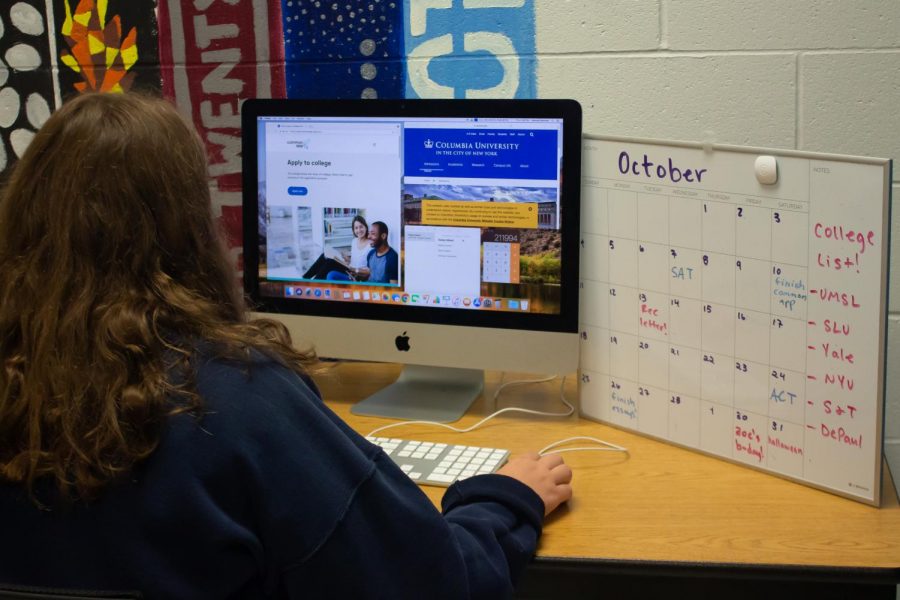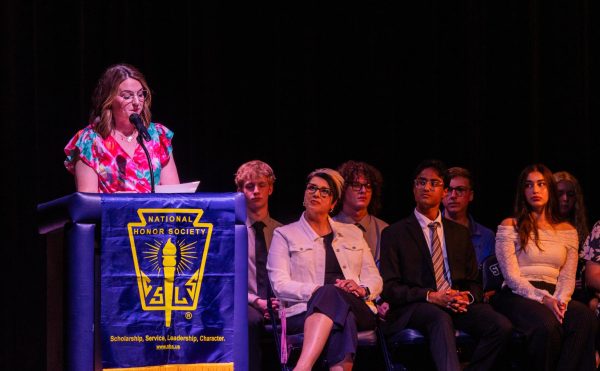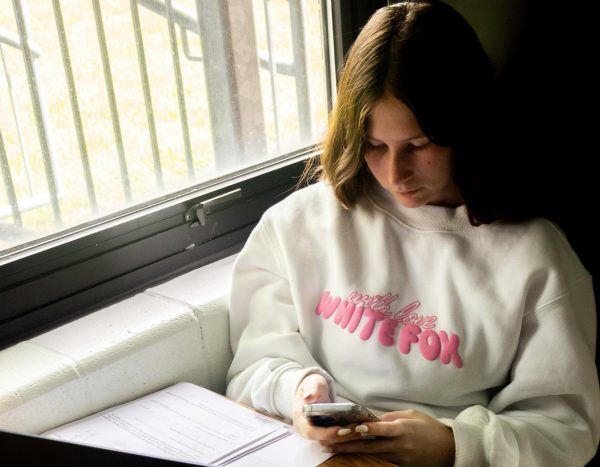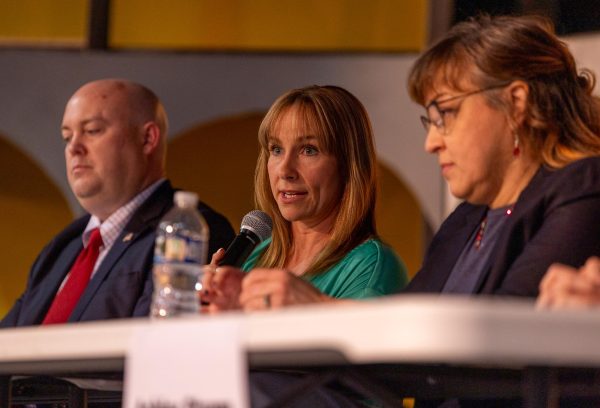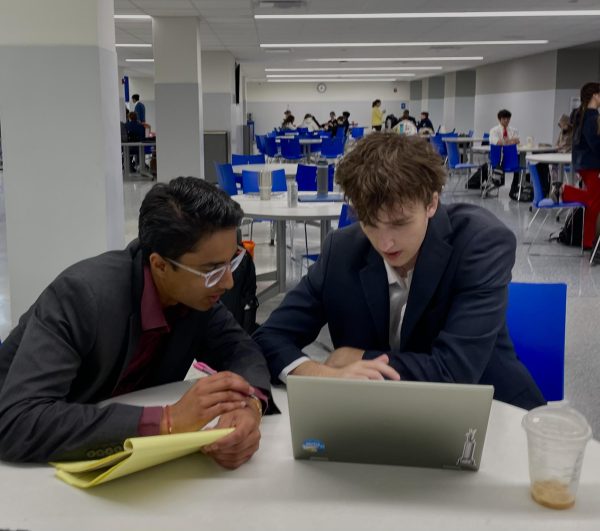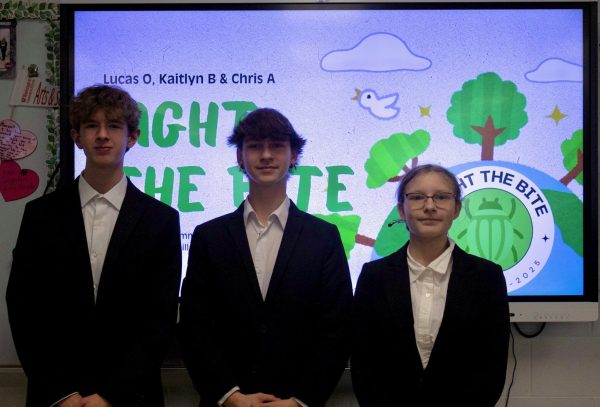The COVID-19 College Conundrum
Senior Paige Fann slaves over the multitudes of deadlines she has to meet for her college applications.
 As a new school year emerges a new batch of seniors start the rigorous process that is college admissions. Senior Sarah Skelly is in the midst of this process. She wants to find a school that has her intended major, isn’t too expensive, and has a reasonable acceptance rate. These are pretty standard concerns when starting to apply to college, but now there’s a new contestant in the arena of challenges she must face this year: COVID-19.
As a new school year emerges a new batch of seniors start the rigorous process that is college admissions. Senior Sarah Skelly is in the midst of this process. She wants to find a school that has her intended major, isn’t too expensive, and has a reasonable acceptance rate. These are pretty standard concerns when starting to apply to college, but now there’s a new contestant in the arena of challenges she must face this year: COVID-19.
As if this wasn’t already an incredibly stressful process, the ongoing pandemic has only made things more tedious. The challenges and uncertainties many students are facing are bringing to light an array of questions: What if you’re unable to complete all your standardized testing? What are you supposed to do now that your extracurriculars got canceled? How are you supposed to find time to volunteer if you have an obligation to your family?
These concerns, and many more, are being thoughtfully considered by college admissions offices all over the world. How well have they actually been able to adapt to these changes?
According to Michelle Breuer, our resident college and career counselor, the only major difference in the initial application process are college visits being moved online, and the increase of schools becoming test optional. Many kids are able to breathe a sigh of relief at the news that ACT’s and other standardized tests will be optional.
“It’s always been online so there’s really no change there,” Mrs. Breuer explained.
With how tech-savvy our generation is, this isn’t that big of an obstacle. Students are, of course, still struggling with the basic ins and outs of an application.
“Their biggest thing is the essay,” Mrs. Breuer said.
All students, even from generations past, have struggled to put their life stories into a 500 word essay. Students can rest assured COVID-19 hasn’t changed much with the initial application process.
The supplemental part of the application seems to be pretty standard in comparison to previous years. Where it starts to get a little fuzzy is with extracurriculars. Senior Reed Easterling recognizes that struggle.
“Everyone is in the same boat [in terms of extracurriculars], so it’s mainly focused on what you did prior to everything,” Easterling said.
This is a point of concern for many students, especially those who’ve missed out on opportunities because of the pandemic. In order to make up for this loss, many schools will be focusing more heavily on academic performance and will be going test-optional or test-blind, which means they won’t take standardized tests into consideration at all. For some, this can be a blessing or a curse.
“That can hurt some students, like me, who have higher test scores than GPA comparatively,” Easterling said.
He still plans on boosting his standardized test scores to give his application a little more of an advantage. For extremely competitive schools, such as Yale which is where he plans on applying early action, these extra measures are necessary for a standout application.
The struggle with getting standardized tests completed is securing a spot to be able to take it. With new protocols being put into place, all testing facilities have limited capacity. This combined with the limited testing dates, and overabundance of students, can make it hard to secure your spot. However, many students are more than willing to go that extra mile.
“Some friends of mine have had to go to Rolla and stay the night to take their ACT’s,” Easterling explained. Skelly also lamented her struggles with taking the test.
“The last testing place that was open for me to sign up for was Orchard Farms, which is 30 minutes away,” Skelly said.
She described the testing environment, one consisting of only eight other students, all wearing masks.
When students aren’t thinking about the content of their application, they’re thinking about where they’re going to apply. A big decision-maker in that aspect is college visits. Students are led around campus by a tour guide and can ask every question their heart desires, all while getting a feel for what could be their future school. Obviously, COVID-19 has thrown a damper on that experience. Many schools have instead opted for virtual tours, Skelly has been able to visit some schools through this online option.
“A lot of schools do use a 360-degree camera and you can tour the campus online, and some of them will have a tour guide standing there and they’ll talk to you as you’re looking through the campus,” Skelly mentioned.
Some schools do still offer in-person college tours, Skelly specified the University of Cincinnati was an institution that offered it.
“You can go to their school, but they’re not going to have tour guides, you just kind of walk around the campus,” Skelly explained.
These self-guided visits are an option many schools have taken up. The con to this is the inability to ask specific questions should they arise, but the pro is you can achieve a much more personal visit to campus and focus on yourself and your feelings towards the school.
The college admissions experience is not a pleasant one. The current state of the world has not made it any easier.
“Colleges know that everyone is struggling right now, and I think they are trying their best to compensate for the losses a lot of students are facing,” Skelly said. 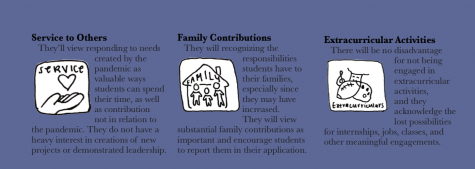
Your donation will support the student journalists of Francis Howell Central High School. Your contribution will allow us to purchase equipment and cover our annual website hosting costs. FHCToday.com and our subsequent publications are dedicated to the students by the students. We hope you consider donating to allow us to continue our mission of a connected and well-informed student body.




